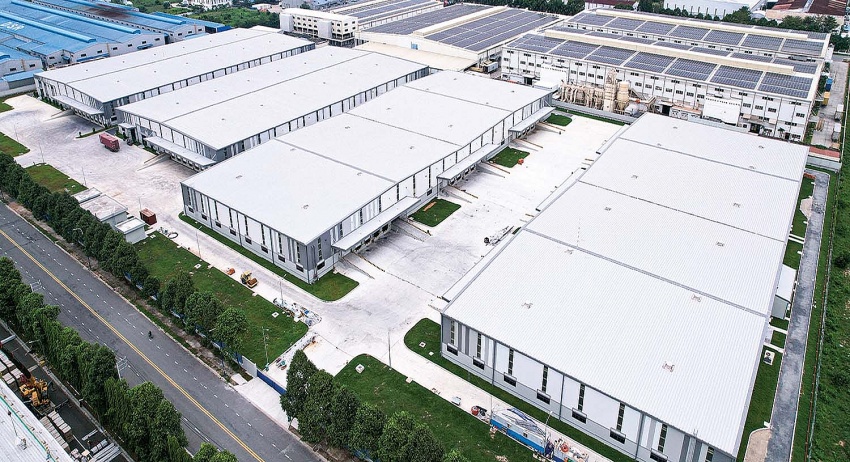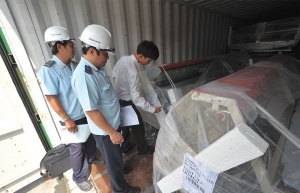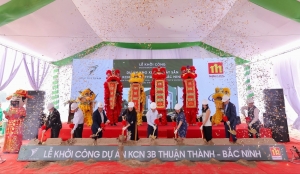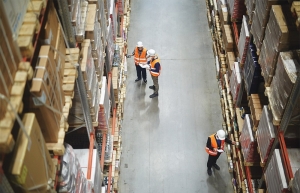Warehouse and ready-built factory developers adopt ESG standards
 |
| Warehouse and ready-built factory developers adopt ESG standards. Photo: baodautu.vn |
LOGOS Vietnam is eager to implement the construction of Logos Yen Phong 2A located in the northern province of Bac Ninh to contribute to the warehouse and ready-built factory market in the next year.
Glenn Hughes, CEO of LOGOS Vietnam, told VIR at a signing ceremony marking long-term strategic cooperation between LOGOS and VNIC in late September, “Many of our partners are exporters, paying attention to ESG factors, so we make our buildings more energy efficient with more recycled materials. The development’s high-quality warehouse will maximise the storage capacity of operations and provide an energy-efficient, green, and sustainable working environment for tenants.”
“Our customers include foreign manufacturers and logistics companies, and due to global commitments to ESG principles, they bring these ideas to Vietnam. Vietnamese policies and laws also promote ESG standards, so there is greater awareness. Industrial parks are trying to respond by making their environments more sustainable and energy efficient.”
LOGOS has also introduced its existing tenants to ESG standards, and is encouraging them to minimise the use of plastic and use energy effectively.
“We also have an initiative to create a better environment for workers and the local community. We create landscapes for gardens and other facilities to grow fruit and vegetables to give back to the community and workers. We try to encourage ourselves and our customers to have more respect for the environment and more support for the local community, and to follow good governance as well as good decision-making, which is open and transparent. This is always a challenge, but as regulations and awareness grow, so will ESG standards, and this will support us on our path,” he said.
ESG is not just a trend but a strategic direction for the sustainable development of real estate businesses in Vietnam. At COP26, Prime Minister Pham Minh Chinh stated the goal of achieving net-zero emissions by 2050. This demonstrates that the government and businesses are working together to reshape the urban landscape by integrating technology and training to enhance the living environment.
According to Cushman & Wakefield’s estimates, the demand for green industrial assets in Vietnam such as land, factories, and warehouses will increase rapidly, mostly driven by the manufacturing, e-commerce, 3PL, and retail sectors. These are sectors that have a significant impact on the environment, making it crucial for industrial investors to reduce carbon emissions, ensure a healthy working environment, and preserve residential surroundings. Green development in industry also contributes to upgrading and rationalising the value chain, enhancing resilience, and preventing supply chain disruptions.
In theory, meeting ESG standards should not be difficult, as the cost difference between constructing a green building versus a traditional one is relatively small. In practice, however, the biggest challenge lies in the time required to develop an ESG-compliant design, and the sustained efforts businesses must make to adhere to these standards throughout the project, according to Cushman & Wakefield.
 | ASEAN strength to be built on with trade reforms Vietnam and ASEAN member states are jointly deploying measures to boost the region’s economy, with a focus laid on upgrading a regional agreement on trade in goods. |
 | Factory and warehouse project set to draw foreign investors to Bac Ninh Industrial property developer KCN Vietnam Group JSC (KCN Vietnam) broke ground on a factory and warehouse project in Thuan Thanh III Industrial Park on April 17 in the northern province of Bac Ninh. |
 | Foreign investors dominate warehouse segment Foreign developers are dominating the modern warehouse market in Vietnam, accounting for over three-quarters of market share by net lettable area in 2023. |
What the stars mean:
★ Poor ★ ★ Promising ★★★ Good ★★★★ Very good ★★★★★ Exceptional
Related Contents
Latest News
More News
- Sembcorp Development secures licence for VSIP in Khanh Hoa (December 31, 2025 | 18:54)
- Prodezi Long An advances towards integrated eco-centric industrial park model (December 26, 2025 | 11:16)
- Amata to develop $185 million Amata City Phu Tho (December 23, 2025 | 17:49)
- Work starts on Nhat Ban – Haiphong Industrial Zone Phase 2 (December 19, 2025 | 16:43)
- Becamex – Binh Phuoc drives sustainable industrial growth (November 28, 2025 | 15:22)
- South Korean investors seek clarity on IP lease extensions (November 24, 2025 | 17:48)
- CEO shares insights on Phu My 3 IP’s journey to green industrial growth (November 17, 2025 | 11:53)
- Business leaders give their views on ESG compliance in industrial parks (November 15, 2025 | 09:00)
- Industrial parks pivot to sustainable models amid rising ESG demands (November 14, 2025 | 11:00)
- Amata plans industrial park in Ho Chi Minh City (November 04, 2025 | 15:49)

 Tag:
Tag:



















 Mobile Version
Mobile Version